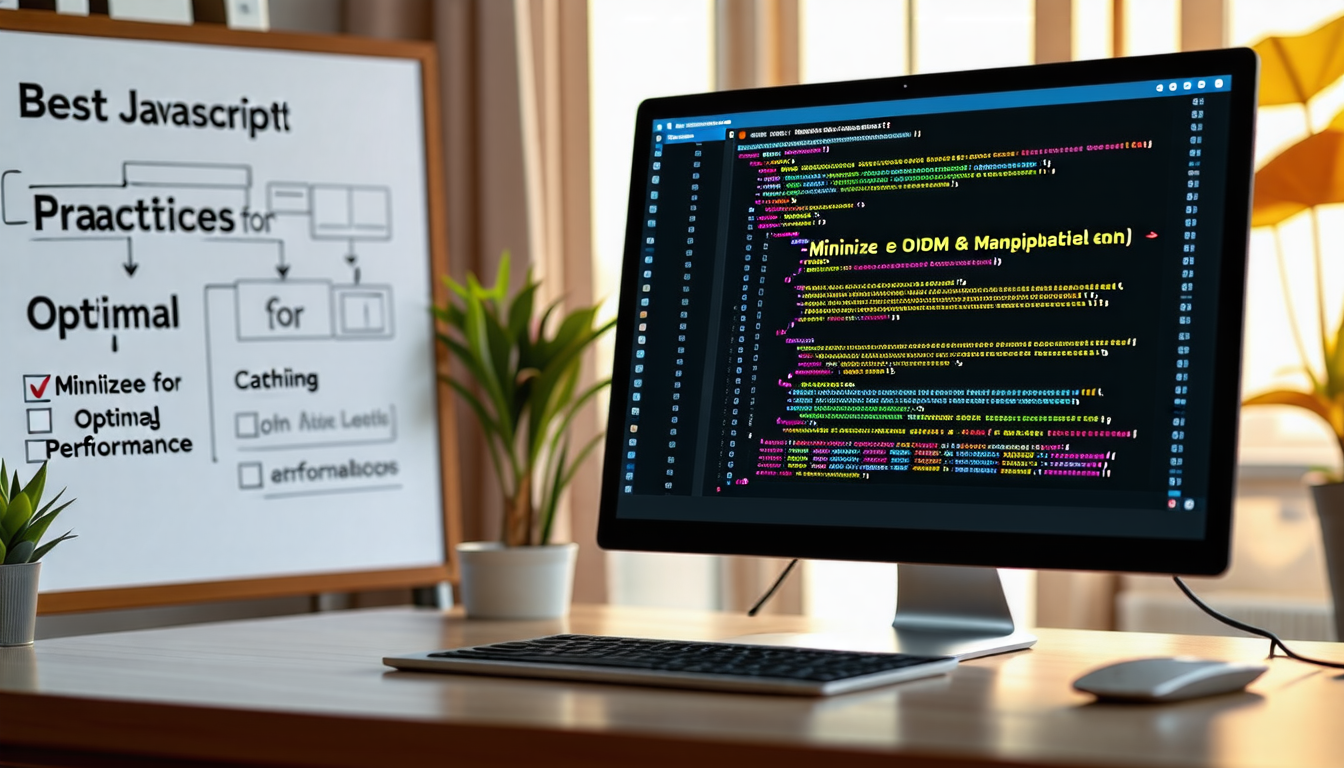|
IN BRIEF
|
In the vibrant world of web development, JavaScript stands as a powerhouse, driving interactivity and enhancing user experiences across the digital landscape. However, as applications grow in complexity, the importance of adhering to best practices for optimal performance cannot be overstated. Crafting efficient and responsive code is not just a nicety, but a necessity to ensure that our web creations run smoothly and delight users. From minimizing global variables to strategically managing DOM access, adopting these practices can significantly reduce load times and boost responsiveness. In this exploration, we will dive into essential techniques that every developer should embrace to elevate their JavaScript proficiency and ensure their applications shine brightly in an ever-evolving tech ecosystem.

Maximizing the performance of your JavaScript code is essential for creating fast, responsive web applications. Proper optimization not only enhances the user experience but also ensures that resources are used efficiently. Below are several practices that will help you achieve optimal performance in your JavaScript code.
Best JavaScript Practices for Modern Development
To achieve optimal performance in modern web applications, it’s essential to adopt suitable JavaScript practices. Familiarize yourself with the latest and most effective strategies by exploring curated resources such as Best JavaScript Practices for Modern Development. Incorporating these approaches into your project lifecycle will enable efficient, high-quality applications that meet user expectations.
Optimize Loops
Loops are a fundamental part of JavaScript, but they can significantly impact performance if not implemented wisely. By streamlining your looping processes, you can greatly boost performance. Use the caching technique to save the length of an array before entering a loop. This prevents repeated calculations, allowing your code to execute faster. Also, consider reducing the activity inside the loop to a minimum and making sure you’re not performing unnecessary operations repeatedly.
Utilize Efficient Data Structures
Choosing the right data structure can dramatically affect performance. For instance, opting for a hash table instead of an array for look-ups can provide significant speed advantages, especially when handling large data sets. When selecting data structures, analyze the time complexity of your operations to ensure you’re making the most efficient choice possible.
In the world of web development, optimizing JavaScript performance is increasingly vital as it directly impacts user experience and page load times. To enhance efficiency, developers should adopt renowned best practices. For instance, minimizing global variables is essential because their misuse can lead to unintentional overwrites that can disrupt functionality. By saving variables within local scopes, developers can significantly reduce memory usage, hence boosting performance.
Furthermore, leveraging techniques such as *minifying* and *bundling* code can lead to faster loading times by decreasing file sizes. According to recent studies, a mere 100-millisecond delay in page load can lead to a 7% reduction in conversions, showcasing how critical performance optimization is in retaining visitors.
Moreover, optimizing loops and limiting direct DOM access can dramatically improve execution speed. Developers should consider using Web Workers for performing complex computations in the background, allowing a smoother user interface. Additionally, tools like WebAssembly play a pivotal role in enhancing JavaScript execution efficiency. For more insights into the ongoing evolution of JavaScript and its impact, explore resources at PersistenceJS.

When it comes to web development, optimizing your JavaScript is essential for enhancing site performance. To achieve this, focus on minimizing the use of global variables, as they can lead to conflicts with other scripts. Adopting a consistent coding style and giving descriptive names to your variables and functions can significantly improve code readability and maintainability. Furthermore, remember to minify and bundle your code to reduce load times. Utilize efficient data structures, and avoid unnecessary variables, especially within loops. Techniques like debouncing, throttling, and lazy loading can also boost performance. By following these best practices, you’ll ensure your JavaScript runs smoothly and efficiently, ultimately enhancing user experience.
FAQ
What are the best practices for optimizing JavaScript performance?
R: To enhance JavaScript performance, consider practices such as minimizing global variables, caching objects, and optimizing loops. Additionally, utilize efficient event handling techniques and minimize direct DOM access.
Why is it important to avoid global variables?
R: Global variables can lead to unexpected behavior and conflicts, as they can be overwritten by other scripts. By limiting their use, you create a more predictable and maintainable code environment.
How can I measure the performance of my JavaScript code?
R: Use various tools such as browser developer tools, performance profiling, and benchmarking libraries. These will help you identify bottlenecks and optimize the critical areas of your code.
What is the role of minification and bundling?
R: Minification reduces the size of your JavaScript files by removing unnecessary characters, while bundling combines multiple scripts into a single file. Both techniques improve load times and reduce network requests.
What are some efficient ways to handle events in JavaScript?
R: Implement debouncing and throttling techniques to manage event handling more effectively. This prevents excessive function calls and enhances the overall performance of your JavaScript applications.
